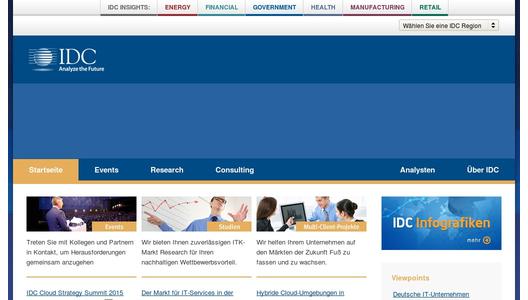Following the Greek referendum which handed an overwhelming victory to the "oxi front" ("No to bailout conditions"), understanding Greece's evolution in the near future and its role in Europe is even harder than before. Given today's final deadline being positioned to the Greek government, IDC is working on two scenarios to understand the potential impact on IT spend:
- Scenario 1: Negotiations will fail and Greece's exit from the Eurozone will materialize. As a result, IT spend in Greece will see a significant decline. European IT spend will be somewhat affected, but not enough to move current expected growth rates into 'negative territory'.
- Scenario 2: Greece will reach an agreement on a bailout with its European counterparts and will keep the Euro currency. Despite this agreement, the resulting drop in business confidence will mean a double-digit decline in IT spending in Greece in 2016, albeit at less accelerated rate than Scenario 1. Overall Western European IT spend will remain largely unaffected.
In the first scenario, IDC believes that without an agreement on financing the Greek deficits, the country will default and exit the Eurozone with the return to a local currency. IDC is assuming a steep drop in the Hellenic GDP, but the effect on other Western European countries' GDP expected to be relatively contained. In this respect, IDC is currently placing low probability on the projection of a "snowball" effect on the other heavily indebted European economies (Portugal, Ireland, Italy, and Spain).
"The industry sectors whose IT spending could be more negatively impacted by the Grexit scenario are the public sector, financial services, and consumer market. Tourism and accommodation, a sector that counts for almost 15% of the national GDP for Greece, is suffering from the uncertainty of the last period. Nevertheless a devaluation of a possible new currency could attract foreigner attention in the longer-term", said Andrea Siviero, Senior Research Analyst, IDC European Industry Solutions.
In the second scenario, IDC maintains that an agreement between Greek government and IMF, EU and ECB would lead to a long-term reinforcement of the Eurozone. Nevertheless this will not be sufficient to produce immediate positive effects for Greece, whose destiny will mainly depend on the political reforms that will have to be adopted.
According to IDC's 15Q2 Black Book Preliminary version, Greece accounts for just 0.5% of 2015 Western Europe's IT spending (considering hardware, software, and services), and is currently the worst performing Western European country in terms of IT spending (-0.1%, 2015-2019 CAGR). Starting from this baseline, IDC envisions two scenarios' effects on IT spending as below:
- Scenario 1: National Greek IT spending will be strongly negatively impacted, due to the flight of foreign companies, an increase in local companies' default rate and a lack of liquidity on the market (which will reduce probability of payments for IT products and services). Greece's IT spending (already the slowest-growing in WE) is forecast to face a further contraction and is expected to experience a -14% decline in 2015 and -18% in 2016, with 2015-2019 CAGR (Compound Annual Growth Rate) going from -0.1% to -6.9%.
Effects on other WE countries IT spending will be largely contained (with a slightly stronger effect on countries more exposed to Greek debt such as Germany, France, and Italy).
However, the resulting uncertainty around the future of the Eurozone and the negative impact on business confidence will mean that growth in Western European 2016 IT spending will reach 0.8% (down from the previously forecast 1.6%).
- Scenario 2: In terms of IT spending, Greece will still lag behind with respect to other Western European countries, at least in the short term. This is mainly due to the continued EU austerity measures that will be imposed on the country and that aim at generating positive economic growth over the longer term. In terms of Greek IT spending, we expect a contraction of -7% in 2015 and -12% in 2016, with 2015-2019 CAGR dropping down to -4.8%.
In this scenario, we expect no direct effect on IT spending for the rest of Western Europe, with other countries that will just partially benefit from the optimistic markets' reaction that will probably follow from this scenario in the next years. Western Europe's total IT spending growth in 2016 would be expected to decline to approximately 1% (down from the previously forecast 1.6%), with a relatively quick return to the previous forecast growth levels.
"Whilst macroeconomic shocks such as possible Grexit tend to affect most technology areas, we believe that hardware spending in the country will see a stronger negative impact especially in the 2015-2017 timeframes, as recurring maintenance fees and multi-year contracts will protect software and services - at least to some extent", said Giorgio Nebuloni, Associate Research Director, IDC European Infrastructure and Software.
'Tracking IT spend in Greece back to 2007 (its pre-crisis peak), we have already seen a 1/3 reduction of IT spending as compared to 2015. The current situation leads IDC to forecast a further drop in IT spending for 2016 if Greece leaves the Eurozone, reaching an extent where we could see an overall reduction in annual IT spending between the peak in 2007 and 2016 of nearly 50% (or just under $2bn)" highlights Tom Meyer, GVP of European IT research. 'Despite this, we do expect the recent resilience in IT spend seen in the other European markets to sustain reasonable growth in either of the scenarios for the broader region through the course of the forecast period.'

